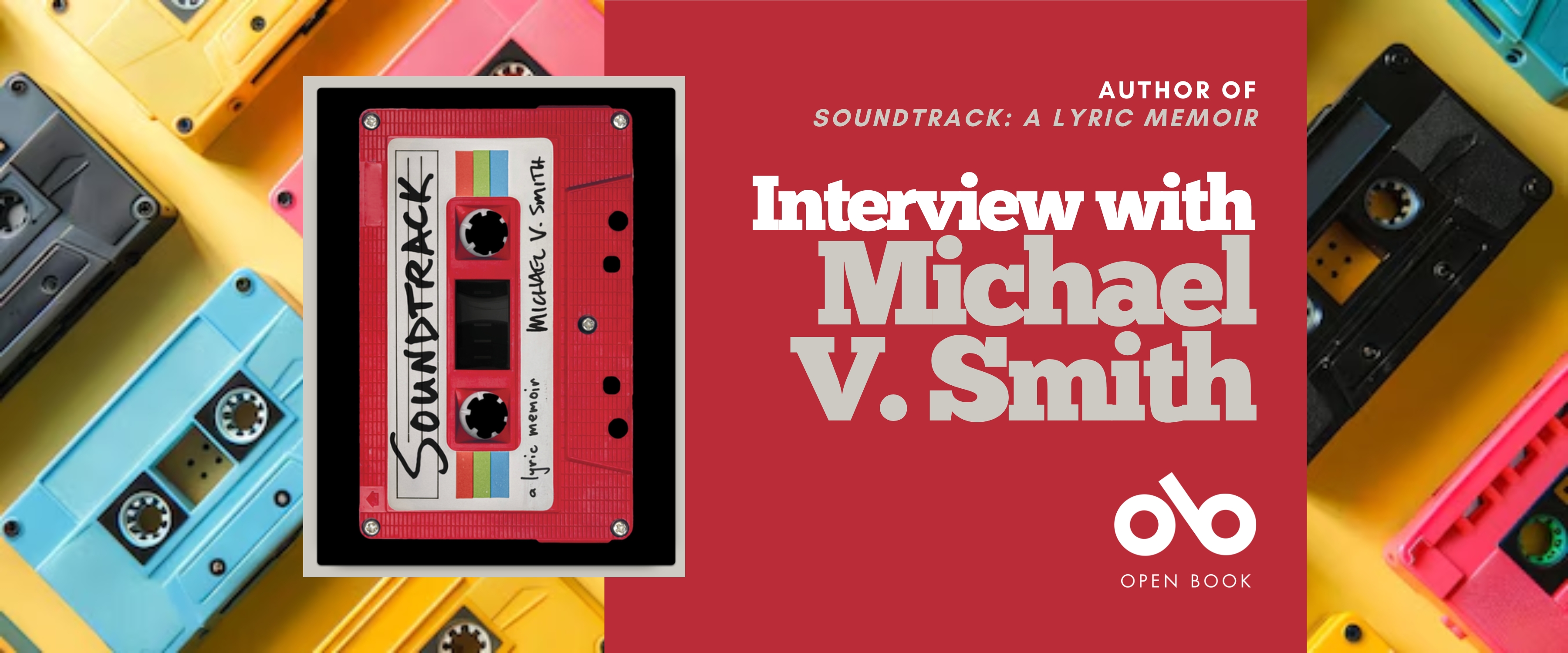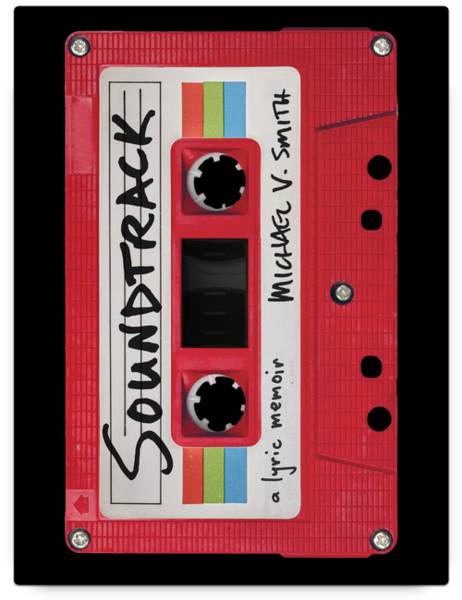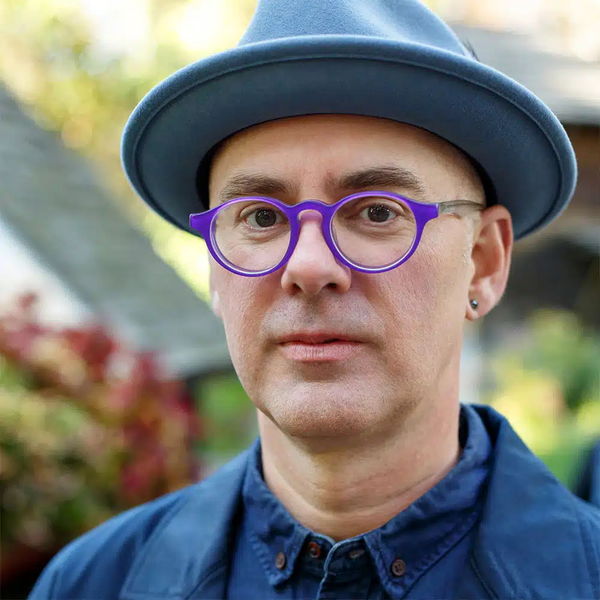The Music in SOUNDTRACK Chronicles the True Joys and Looming Dangers of an Important Cultural Era
Michael V. Smith has long been celebrated for his fearless and generous writing, and his newest work, Soundtrack (Book*hug Press), is no exception. This poetic memoir captures the spirit of an era when music carried both the promise of joy and the looming shadow of fear. With every page, Smith brings readers into a vibrant and deeply personal history of growing up gay during the years marked by the AIDS crisis, crafting an unforgettable journey that pulses with rhythm and memory.
Guided by the albums and songs that shaped a generation, Smith revisits moments of longing, discovery, and resilience. His poetic voice intertwines with cultural echoes from the last decades of the millennium, tracing how music has always had the power to tell us not only where we have been, but also who we have become. From the first blush of infatuation with a cassette of Thriller to the liberating ecstasy of dance floors alive with “Groove Is in the Heart,” Soundtrack becomes a living archive of queer identity, survival, and joy.
Full of wit, tenderness, and honesty, Soundtrack charts a moving course between public history and private life. Smith chronicles the battles, the heartbreaks, and the triumphs alongside the sheer exhilaration of being alive and in love. In doing so, he gives readers a memoir that is both intimate and universal, reminding us that music is more than a backdrop to memory. In his hands, it becomes a map of survival and a testament to the power of community and self-expression.
We've got a very insightful Line & Lyric Interview with the author to share with Open Book readers today! Check it out.
Open Book:
Tell us about this collection and how it came to be.
Michael V. Smith:
Some of these poems just sort of sprang out of me when I was on a writing retreat during the covid lockdown. Each of the nineteen poems in the collection uses songs or albums from my youth as a mnemonic device for “where I was when.” At some point, I had an idea for a project to imagine what other writers might do with a prompt from the same music. I applied and received a grant from UBCO’s Equity and Inclusion Office to do an online poetry/oral history project with nine other queers. In each live-broadcast episode, we took turns reading our poem inspired by the same album, then talked about the distance between those two experiences. After the project was completed, I had over a dozen poems. I realized I still had many other albums that reminded me of a time and place, so I wrote more and—tada.
OB:
Was there any research involved in your writing process for these poems?
MVS:
I did a wide variety of research. Obviously, I listened to all the albums. A lot. I read the lyrics for most everything, and read up on a bunch of the artists. Not a lot of that made its way into the book, but it was a helpful memory jog, really. I did a lot of memory work—trying to get myself back into the body and brain of the kid I was, so I read my journals, talked to friends and family, scrolled news headlines. I also researched a bunch of AIDS facts, especially events I remembered but not the when. I also researched and edited this collection by doing readings to groups of friends, with talk-backs. That was enormously helpful, because I got insight into what others remembered—what cultural moments and attitudes stuck with them. I’m going to roll readings into my editing process for every poetry book going forward. I loved those experiences.
OB:
What was the strangest or most surprising part of the writing process for this collection?
Your CanLit News
Subscribe to Open Book’s newsletter to get local book events, literary content, writing tips, and more in your inbox
MVS:
I was shocked at how much I had forgotten. Reading my journals was an eye-opener. Especially my first visit to a gay bar. I remembered it as delicious and exciting, with a bunch of anxiety or nerves too, but my journal narrator was a total prude. Past me complained about the porn on the video cameras, for example, which—from this perspective—seems so normal in a gay bar. It’s almost quaint. But at the time, it scandalized me.
OB:
Who did you dedicate the collection to and why?
MVS:
I dedicated this book to my dear friend and intentional family member Kim Kinakin, who died last year. I wrote the final poem in the book on the day he died. Kim had a glorious life, while living with HIV from a young age. He’s featured in the last three poems in the book. He used MAID, as his health was declining due to a blood cancer that is more prevalent in HIV patients. So, this is a book for Kim, that Vancouver punk rock legend who inspired me no end.
OB:
What advice would you give to an emerging or aspiring poet?
MVS:
I tell all my students to get involved in community. If you want to be a writer, the best thing you can do is go out to see other artists and art. Make stuff with friends. Put on shows. Celebrate your friends. Their success is your success, so don’t be envious. Revel in the pride of lifting your friends up.
OB:
For you, is form freedom or constraint in poetry?
MVS:
I don’t think form is either, exactly. Constraint is more a tool than a state of being. Using constraint can be very freeing, especially if you aren’t sure what to do or where to go. Pick a constraint. Limitation is expansion, Robert McKee says about filmmaking, and film is the closest genre to poetry. (Film is poetry. A collection of dense, cumulative, collaged images that manifest in short cuts/lines, through time.) All poems have form, although some are more recognizable or conventional. But I think of form as a tool that helps manifest the meaning. Like, in Soundtrack, I’m using the page to annotate the voice, to embody feeling through shape/space/density/etc. There is no poem without form, unless maybe it’s written in invisible ink. Whispered in a windstorm. Form to me is thinking of the poem as a visual object, and a time-based object, and an object of relational subjectivity. Meaning, we are trying to use the shape/page/space to recreate a feeling or impression that travels from one mind-body to another, so form is a vehicle in that translation. Form is a key component of the word machine. Constraint and freedom are qualities used to embody that form/feeling.
OB:
What are you working on next?
MVS:
The plan is to turn this book into a feature film, part performances, part memoir, part documentary about culture during the AIDS crisis. Seen through this pinpoint of my perspective in a vast media explosion of activism, news, and celebrity.
_________________________________
Michael V. Smith is a writer, performer, and filmmaker. His poetry has been shortlisted for the ReLit Award, his fiction has been shortlisted for the Journey Prize and Amazon Canada First Novel Award, and his queer memoir My Body Is Yours was shortlisted for a Lambda Literary Award. Smith is the winner of a Western Magazine Award, numerous film awards, and the inaugural Dayne Ogilvie Prize from the Writers’ Trust of Canada. He is currently a professor in Kelowna, BC, where he lives with his husband on the unceded territory of the Syilx Okanagan people.






